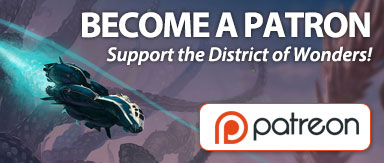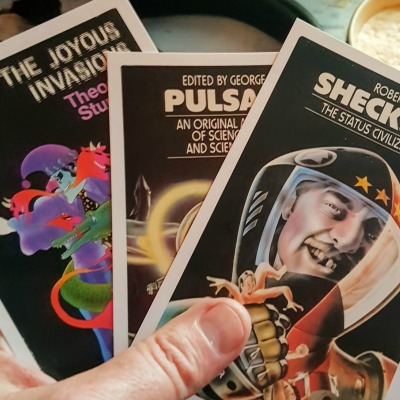Coming Up…
Interview: Carli Velocci Why do we keep using Nazis in space trope?
Main Fiction: “A Dying Fall” by Christopher Priest
Christopher Priest’s book – The Inverted World
Originally published in Asimov’s – December 2006
Christopher Priest was born in Cheshire, England. He began writing soon after leaving school and has been a full-time freelance writer since 1968. He has published thirteen novels, four short story collections and a number of other books, including critical works, biographies, novelizations and children’s non-fiction.
His novel The Separation won both the Arthur C. Clarke Award and the BSFA Award. In 1996 Priest won the James Tait Black Memorial Prize for his novel The Prestige. He has been nominated four times for the Hugo award. He has won several awards abroad, including the Kurd Lasswitz Award (Germany), the Eurocon Award (Yugoslavia), the Ditmar Award (Australia), and Le Grand Prix de L’Imaginaire (France). In 2001 he was awarded the Prix Utopia (France) for lifetime achievement.
He has written drama for radio (BBC Radio 4) and television (Thames TV and HTV). In 2006, The Prestige was made into a major production by Newmarket Films. Directed by Christopher Nolan, The Prestige went straight to No.1 US box office. It received two Academy Award nominations.
Chris Priest’s most recent novel The Gradual will be published by Gollancz in 2016, and in the USA by Titan Books, He is Vice-President of the H. G. Wells Society. In 2007, an exhibition of installation art based on his novel The Affirmation was mounted in London.As a journalist he has written features and reviews for The Times, the Guardian, the Independent, the New Statesman, the Scotsman, and many different magazines.
Narrated by Mikael Naramore
Mikael Naramore has worked in the audiobook industry since 2001 when, fresh out of college, he was hired as a recording engineer for publisher Brilliance Audio (now Brilliance Publishing, subsidiary of Amazon.com). Over time, he transitioned to Director, all the while absorbing technique and nuance from the best actors in the business. To date, Mikael has narrated well over 100 titles, under his own and assumed names. Authors range from best-sellers Nora Roberts, Lisa Gardner, Edward Klein and Clive Barker to sci-fi rising stars Wesley Chu, Ramez Naam and Mark E. Cooper.
He was recently chosen to narrate prolific playwright and Oscar-nominated screenwriter Robert Ardrey’s seminal Nature of Man series which includes the international best-sellers African Genesis and The Territorial Imperative, titles which reportedly had a very heavy influence on Arthur C. Clarke and Stanley Kubrick in their development of 2001: A Space Odyssey as well as Kubrick’s adaptation of A Clockwork Orange.
Mikael is also an active writer, musician and recording artist, having scored the soundtrack to an independent short film, produced and engineered critically acclaimed rock records, and written, performed and recorded several “silly little lo-fi rock songs” of his own. He currently resides in the wild and scenic Columbia River Gorge outside of Portland, Oregon with his wife, two small boys and their beloved Golden Retriever.
Discuss this episode on our forums.
Podcast: Play in new window | Download



 Subscribe Via iTunes
Subscribe Via iTunes Subscribe to RSS feed
Subscribe to RSS feed Like us on Facebook
Like us on Facebook Follow us on Twitter
Follow us on Twitter
I thought Carli Velocci’s interview was interesting, but it lacked ‘historical imagination.’ That is, it was too “presentist.” OK, what do I mean by that? First of all, think of the people who see Nazis in movies and make them their bad guys – who are Nazis to THOSE people? This is going to shift from generation to generation, or even over decades. For my parents, Nazis really were evil incarnate. They lived through WWII and then the refugee crisis and the revelation of the Holocaust. It was truly horrifying. And for filmmakers of that time, depicting the Nazis as evil was both how they felt and part of the propaganda of the time. (Remember the bad-guy Nazi in Casablanca? He was a fine German immigrant actor who got typecast, and who was content to depict the evil as over-the-top evil in films.)
It is, honestly, not at all surprising that all sorts of popular entertainment of the time did over-the-top Evil Nazis. Heinlein was of my parent’s generation.
Stalag 17 was a post-War depiction of evil Nazis, more nuanced, aware of the evil of good people, too. My parents loved that. When I was a kid, I thought was BORING.
Hogan’s Heroes was a comedic take on life in a POW camp, and it insulted my parents because it made Nazis into buffoons. But my brothers LOVED that show (I thought that one was STUPID). But in all honesty, the fear in our daily lives was (1) rabies, (2) quicksand, and (3) hiding from nuclear war under our desks. Was saw the Evil Nazis in older films, and to us it was verging on ‘oh, isn’t that interesting.’
Then move forward to the next generation, and by now the Evil Nazi is Symbolic Evil. And, as such, the Evil can be refracted many ways – as buffoonery, as kitsch, as stereotypes, as a sign for ‘they are really bad.’
And while I might have thought that that kind of authoritarianism could not be relegated to symbolic evil in popular media, presidential politics in the US today make me darned nervous.